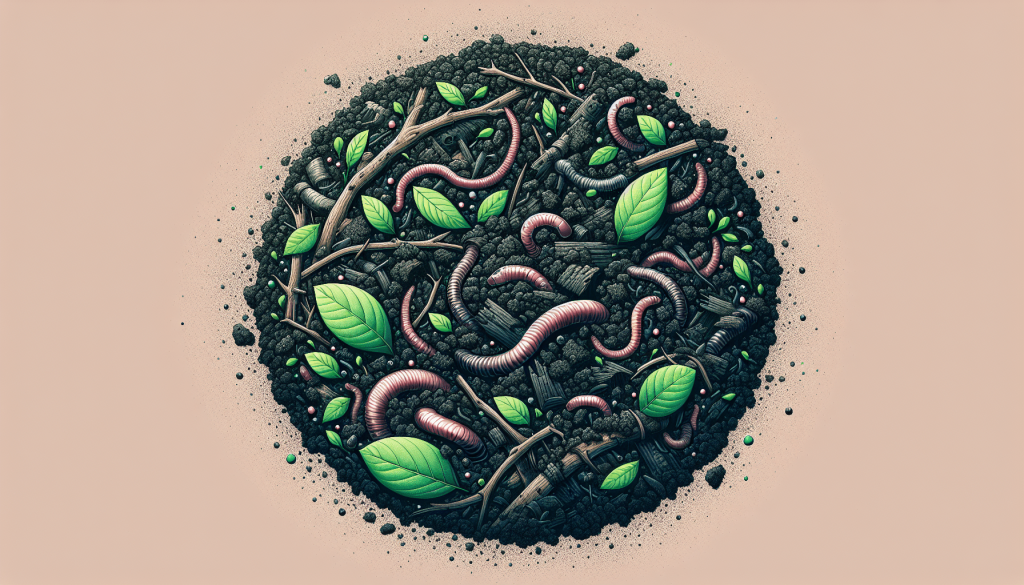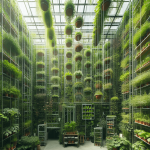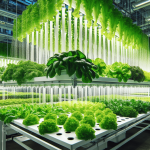This post may contain affiliate links. As an Amazon Associate, we may earn commissions from qualifying purchases.
Have you ever wondered why some gardeners swear by compost as the secret ingredient for vibrant and flourishing plants? It might seem like just a pile of scraps and leftovers, but compost is often hailed as garden gold. Let’s talk about the magic of composting and why many see it as more than just a recycling ritual. Through the following conversation, we’ll unravel the hidden benefits of using compost as a soil amendment and how it can transform your plants from drab to fab.
What is Compost?
Before we plunge into the benefits, let’s chat about what compost really is. You can think of compost as Mother Nature’s special brew—a mixture of decomposed organic materials such as leaves, kitchen scraps, grass clippings, and more. Left to its own devices, this blend breaks down over time, transforming into a nutrient-rich substance teeming with life.
The Decomposition Process
Composting is essentially recycling nature’s own way, but with a twist. The process involves microorganisms that break down the organic material into humus, a dark crumbly substance similar to fertile garden soil. The magic happens due to a combination of carbon-rich “browns,” nitrogen-rich “greens,” water, and air. This harmonious mix creates an environment where microorganisms thrive, converting what once was waste into a gardener’s treasure.
Types of Compost
Did you know that there’s more than one type of compost? Just like choosing between French roast or espresso, there are various types of compost depending on how you prepare it:
-
Cold Composting: This method is fairly hands-off. You let the pile sit, and eventually, it breaks down over time. It’s great for those who prefer the slow and steady approach.
-
Hot Composting: A bit more high maintenance, this method requires the right balance of greens and browns and regular turning to reach higher temperatures. It’s quicker, usually ready in a few months.
-
Vermicomposting: This involves worms, specifically red wigglers, speeding up the decomposition process, turning your waste into nutrient-rich worm castings. It’s ideal for small indoor composting setups.
Why Use Compost as a Soil Amendment?
You may ask—why go through the trouble? Simply put, compost is a superfood for your soil. It enhances soil health in more ways than one, impacting plant growth, ecosystem sustainability, and more.
Enhancing Soil Structure
Compost works wonders on soil structure, be it clay, sandy, or anything in between. It blends with the soil particles, improving its capacity to retain moisture, air, and nutrients.
- Clay Soils: Often compact and difficult for roots to penetrate, compost helps aerate such soils, loosening them up and allowing for better drainage.
- Sandy Soils: These lack structure and tend to drain quickly, but adding compost improves their ability to hold water and nutrients.
- Loamy Soils: Already considered ideal, even loamy soils benefit from compost as it replenishes nutrients and maintains structure.
Boosting Nutrient Content
Compost acts like a multivitamin for your garden. It releases essential nutrients slowly, providing a continuous supply over time. Gardens benefit from:
- Macronutrients: Nitrogen, phosphorus, and potassium are vital for plant growth.
- Micronutrients: Although required in smaller quantities, nutrients like calcium, magnesium, and iron are equally important.
Adding compost can reduce or even eliminate the need for synthetic fertilizers, which are often fast-release and can sometimes harm more than help.
Improving Soil Fertility
Rich in organic matter, compost increases the biological activity in the soil. The presence of beneficial organisms like earthworms and microbes breaks down organic matter, releasing nutrients in forms plants can absorb. Healthy soil teeming with life supports robust plant health and reduces susceptibilities to disease and pests.
pH Balancing
Balancing the pH level of your soil with the right amendments can be tricky, but compost makes this job a bit easier. By buffering the soil, compost moderates pH imbalances, making the soil more suitable for an array of plants. This doesn’t mean it will drastically change the pH, but it assists in bringing soil closer to neutral.

Environmental Impact of Using Compost
Embracing composting is beneficial not only for your garden but also for the environment. By using compost, you’re actively participating in a cycle that promotes sustainability.
Reducing Landfill Waste
Each year, tons of organic waste end up in landfills, unable to break down properly due to limited oxygen. By composting your kitchen scraps and yard waste, you’re diverting this potential landfill fodder and creating a valuable resource. It’s like giving those banana peels a new lease on life!
Lowering Greenhouse Gas Emissions
Organic waste in landfills generates methane, a potent greenhouse gas. By choosing to compost, you’re reducing these emissions—an understated yet vital contribution to slowing climate change.
Conserving Water
Compost’s ability to improve soil structure and water retention helps plants require less frequent watering. Improved water retention means more efficient use of this precious resource, especially important in hotter and drier climates.
Promoting Biodiversity
Healthy compost-amended soils promote biodiversity both above and below the ground. From the worms and fungi in the soil to the pollinators that visit your garden, composting nurtures a balance that supports life at many levels.
Practical Applications: How and Where to Use Compost
By now, you’re likely sold on compost’s myriad benefits, but how exactly do you apply it to get the best results? It’s versatile, serving various purposes in different parts of your garden.
Garden Bed Preparation
Incorporating compost into your garden beds before planting can make a noticeable difference. Simply spread a layer over your soil and work it in with a spade or garden fork. Your soil will thank you, and your plants will show their gratitude with increased vigor.
Mulching
Compost can be used as a mulch to suppress weeds, conserve moisture, and add nutrients. Spread a layer a few inches thick around the base of your plants, keeping it away from stems to prevent rot.
Top Dressing for Lawns
Your lawn can benefit from a boost too. Top dressing with compost helps keep grass green and reduces the need for chemical fertilizers. Lightly sprinkle compost over the lawn, allowing it to sift down to the soil palet, ensuring you don’t smother the grass.
Potting Mix
Container plants desire nutrition just like garden plants. You can create your own potting mix by combining compost with standard potting soil. This ensures a nutrient-rich environment that’s well-drained yet retains moisture around root zones.
Compost Tea
For a liquid boost, try making compost tea—a nutrient-rich liquid similar to a plant smoothie. Soak compost in water, strain out the solids, and use the liquid to water or spray your plants. This offers a quick boost of vitality.

Challenges and Considerations
Of course, as with life, nothing is entirely perfect. While compost provides tremendous benefits for soil and plants, there are a few challenges and considerations to keep in mind.
Compost Quality
Not all compost is created equal. Poor quality or unfinished compost can harbor pathogens or pests. Ensure your compost pile heats up properly, decomposing materials fully before use.
Odor Control
Composting shouldn’t be a stinky affair. Bad odors indicate an imbalance—too much nitrogen, too little air. Maintain proper ratios and turn your pile regularly to keep things sweet-smelling.
Time Investment
Composting is an active process that requires time and occasional attention. Whether turning the pile or managing inputs, it involves a level of commitment. The results, however, often outweigh the effort.
Space Requirements
If space is at a premium, traditional composting may not be feasible. Alternatives exist, such as vermicomposting or bokashi, which require less room and can be kept indoors.
Potential for Contamination
Be wary of potential contaminants in your starting materials. Avoid animal products, diseased plants, and chemically treated materials, as they can introduce unwanted elements into your compost.
Conclusion
It’s clear that integrating compost into your gardening routine is much like becoming friends with that unassuming wise neighbor who enriches your life with presence and knowledge you never knew you needed. By enhancing soil structure, increasing fertility, and supporting a healthy environment, compost truly sets a foundation for a thriving garden while contributing to environmental sustainability. The magic of compost whispers promises of lush growth, resilience, and bountiful harvests, inviting you to partake in a cycle renewed. If you’ve never made your own compost pile, maybe it’s time to sift through your scraps—literal and metaphorical—and see what garden treasures you can unearth.








